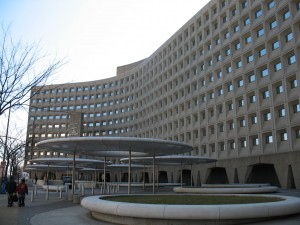
Republican presidential candidate Mitt Romney recently said he'd consider eliminating HUD, whose headquarters are pictured above.
In private comments overheard by reporters, Republican presidential candidate Mitt Romney floated the idea of eliminating the Department of Housing and Urban Development (HUD).
According to the Washington Post, Romney made his comments at a private fundraiser amidst a larger discussion on consolidating government agencies and improving the performance of others.
“I’m going to take a lot of departments in Washington, and agencies, and combine them,” he said. “Some eliminate, but I’m probably not going to lay out just exactly which ones are going to go … things like Housing and Urban Development, which my dad was head of, that might not be around later.”
Housing and the presidential campaign trail have led an interesting relationship since full-time campaigning began in early 2011. Though housing is among the most important sectors of the economy, candidates had largely avoided the topic in their campaigns’ early stages, preferring to vaguely reference the industry’s ills rather than address specific policy measures (though Romney did voice opposition to the government’s foreclosure prevention programs).
That said, Romney received an interesting boost back in December when he placed first in a HomeGain survey that asked Realtors what candidate, among Democrats and Republicans, they supported in the 2012 election. Romney’s 34 percent bested Obama’s 32 percent.
As can be expected in an election season, President Obama’s campaign immediately seized upon Romney’s comments.
Ben LaBolt, a spokesman for the campaign, framed the issue as another sign of Romney’s cozy relationship with the rich, a common theme of the President’s campaign.
“In order to fund his $5 trillion tax cuts for the wealthiest Americans, [Romney] would make deep cuts in programs essential to the middle class like education and housing,” LaBolt said.
And Eddie Eitches, the president of AFGE Local 476, a union representing about 6,000 HUD employees, said in the Post‘s story that Romney is unaware of the full breadth of HUD’s services.
“Most everything he says about the housing industry and the crisis makes no sense,” Eitches said . “We do a lot of things. We engage in fair housing, we stop discrimination, our FHA program provides mortgages for the middle class.”
But not all of the reactions to Romney’s comments have been negative. Josh Barro of Forbes, for instance, argued for Romney’s position in the boldly titled op-ed “Romney is Right: Abolish HUD.”
Writing that many of HUD’s aforementioned services could be absorbed by other, more relevant agencies, Barro also made a more grand, sweeping argument – that by getting out of the housing industry, local governments would be forced to address the imbalances, in his view, that zoning and other land-use laws create. As a result, prices would fall, housing would be more beholden to free market forces, and homes would become more affordable.
Neither side is likely to consent much in the run-up to the Nov. 6 election, but if the reaction to Romney’s comments is any indicator, we could be in for a lively debate on housing-related matters in the coming months.
